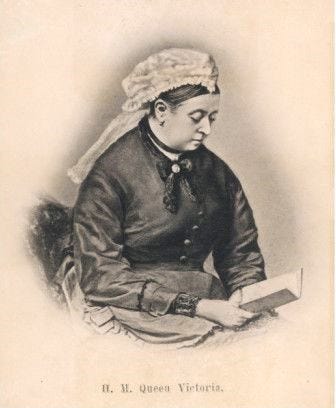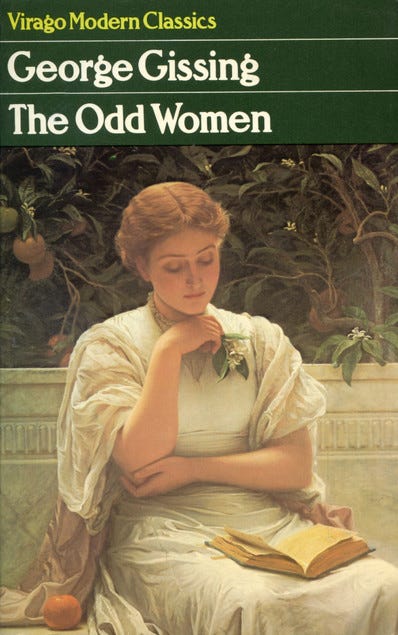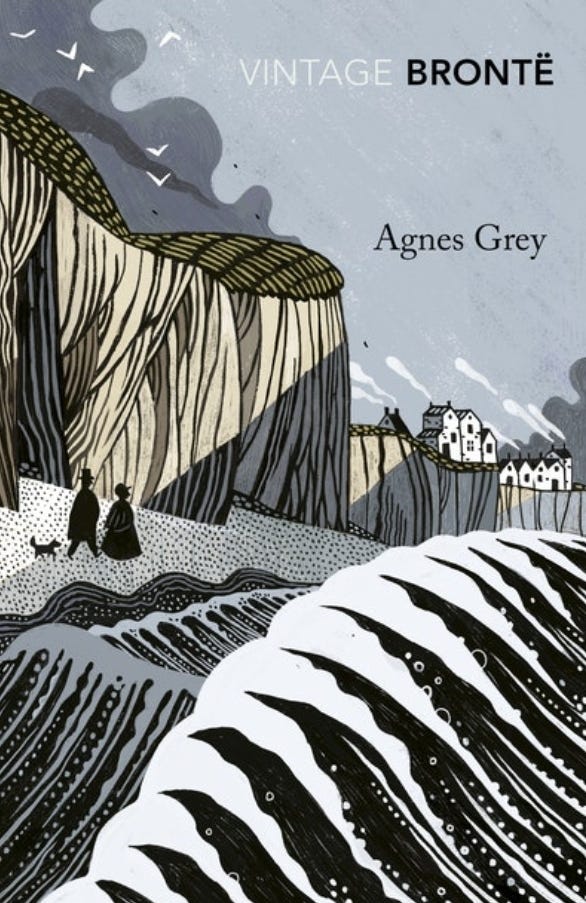[Note: Put cursor over footnote for pop-up.]
Welcome new subscribers!
Victober 2023:
Three years ago I stumbled onto a cohort of English (mostly) women (mostly) who express their spirited love of Victorian literature [via YouTube]. In particular, what they plan to read for Victober.
Compared to my own obsession [David’s Insane Reading Project], devoting a month to British novels published during Victoria's reign (1837-1901) seemed a nearly rational undertaking. So, what the hell, I hopped on the (steam-powered!) train; in a couple of weeks, I’ll do it again.
Just today, I discovered a Victober group at Goodreads:
https://www.goodreads.com/group/show/722891-victober-2023
You’ll find general info and links to videos by the moderators. A word to the wise: Don’t miss Katie Lumsden’s YouTube site, Books and Things:
https://www.youtube.com/@katiejlumsden
How to put this? Let’s say Katie was my gateway drug.1
The Project/Challenge:
Do Victober.2
David’s Top Five Reasons for Reading Victorian Novels:
Victorian novels are typically long. They take a commitment. You spend more time in their world than you would with one of today’s skinny and/or breezy reads—they’re immersive, they’re a room you enter . . . you lock the door behind you, put the kettle on, settle in.
Since many Victorian novels are made into movies or limited TV series, you often get to watch two versions of a story, which not only gives the story a bigger profile in your memory, but lets you observe how a story in one medium is converted into another—the necessary choices, what’s cut vs. what’s kept when an 800-page novel becomes a two-hour film or a six-episode Masterpiece.
As you know, this Substack believes in rescuing good titles perched on the lip of the abyss (to put it a touch melodramatically). And you can do that in Victober—poke around, see what you turn up. But Victorian Lit is rife with classics, and Victober gives you a terrific excuse to tackle a few of these, after which you’ll belong with all those who’ve read, say, A Tale of Two Cities or Middlemarch or Jane Eyre. That invisible community, scattered across space/time—you’re part of it now!
Reading old books shows us how life was lived in other times. We’re fuller humans for having that wider view. We see how our ways of doing things evolved from earlier ways, we see that many privileges/options we take for granted were either unthinkable for any Victorian—or unavailable to Victorians of particular races, genders, economic tiers, belief systems. If we’re attentive readers, the granular detail in old novels cuts through our abstractions about the past, lets us inhabit the day-to-day reality of our ancestors long enough for us to appreciate how it rests on certain assumptions—about the world and its place in the cosmos, about classes of people, about the causes of physical phenomena, illness, and so on. Reading books from the past, even the deep past, also helps rid us of the misguided belief that we, the people of now, are the end product of all that development (as if we’re the major leagues and everything that came before was only sandlot stuff) . . . or that the ancients were, somehow, an alien species, not truly human the way we are. Reading the Satires of Juvenal ( c. 100–127 AD), I could laugh, as his ancient readers laughed, because the horses’ asses he loves to mock are the same horses’ asses we love to mock; and in The Letters of Pliny the Younger, his account of the morning of the 24th of August, 79 AD, when, still a schoolboy, he saw ash clouds billowing from Mt. Vesuvius, and watched his uncle, Pliny the Elder (naval commander and author of Natural History) rush off to his warship to evacuate people trapped on the shore of Naples Bay (a doomed effort that led to his own death)—the story felt as immediate as stories about our cataclysmic weather.
I’m a fan of the smart and new, a fan of works in translation, a fan of writers formerly locked out of the publishing world, a fan of non-canonic literature. But the Victorian period is an incredibly rich reservoir of prose in English. We should revel in it. We shouldn’t abandon it to the PhDs. We should let it entertain us. We should get to know Miss Haversham and Sydney Carton and Becky Sharp, Fagin, Jim Hawkins, Dorothea Brooke, Jane Eyre, Bathsheba Everdene, Dr. Watson, Jenny Wren, Uriah Heep, Tess Durbeyfield, and the scads of others.
Some titles:
I’d been at work on My Insane Reading Project for years when I started Victobering—I’d already logged a number of the works often recommended, the three cited above, along with Bleak House, Tess of the D’Urbervilles, Wuthering Heights, and others.
The ones below are a mix of Victober reads and non-Victober reads, classics and non-classics—but they’re all ones I’ve read and recommend to you.3
Red Pottage, Mary Cholmondeley (1899) 4
Esther Waters, George Moore (1899)
A Child of the Jago, Arthur Morrison (1896)
The Woman Who Did, Grant Allen (1895)
The Time Machine, H. G. Wells (1895)
Trilby, George du Maurier (1894)
The Odd Women, George Gissing (1893)
The Diary of a Nobody, George and Weedon Grossmith (1892)
New Grub Street, George Gissing (1891)
Dr. Jekyll and Mr. Hyde, Robert Louis Stevenson (1886)
Kidnapped, Robert Louis Stevenson (1886)
Treasure Island, Robt. Louis Stevenson (1883)
The Rebecca Rioter, Amy Dillwyn (1880)
The Way We Live Now, Anthony Trollope (1875)
Far From the Madding Crowd, Thomas Hardy (1874)
Erewhon, Samuel Butler (1872) 7
The Moonstone, Wilkie Collins (1868)
Wives and Daughters, Elizabeth Gaskell (1866)
Miss Marjoribanks, Margaret Oliphant (1866)
Our Mutual Friend, Charles Dickens (1865)
Lady Audley’s Secret, Mary Elizabeth Braddon (1862) 8
Great Expectations, Charles Dickens (1861)
The Mill on the Floss, George Eliot (1860)
Dr. Thorne, Anthony Trollope (1858)
Little Dorrit, Charles Dickens (1857)
North and South, Elizabeth Gaskell (1855)
Villette, Charlotte Brontë (1853)
Cranford, Elizabeth Gaskell (1853)
Shirley, Charlotte Brontë (1849)
The Tenant of Wildfell Hall, Anne Brontë (1848)
Dombey and Son, Charles Dickens (1848)
The Half Sisters, Geraldine Jewsbury (1848)
Vanity Fair, William Makepeace Thackery (1848)
My TBRs for Victober 2023:
The Small House at Allington, Anthony Trollope (1862)
Hard Times, Charles Dickens (1854)
Agnes Grey, Anne Brontë (1847)
And . . .
Tell us how it goes.
Lumsden: Her limitless, over-the-top enthusiasm and overall one-of-a-kindness.
And she published her own first novel this year, The Secrets of Hartwood Hall: [https://www.goodreads.com/book/show/61322622-the-secrets-of-hartwood-hall]!
Victober: No forms to fill out, no fees to pay, no required number of books, no required titles [though the moderators will offer various challenges] . . . Just read Victorian fiction during October. Sound do-able?
Victober gave me a chance to read Elizabeth Gaskell—Wives and Daughters, Cranford, and North and South are very good, as are other titles of hers I haven’t gotten to. But, as with all prolific writers, there are duds—one I don’t recommend is A Dark Night’s Work (1863). Mrs. Gaskell (as she appeared on the title page of her early novels) wrote ghost stories, too; I haven’t read these either, but if you like the occult you might check them out.
Cholmondeley: Ah, the Brits . . . you just have to learn how some names are said—for instance, a college friend whose middle name was St. John instructed me to pronounce it: Sin-Jin. Anthony Powell’s surname is Poule. Marjoribanks is Marchbanks. And one of the pleasures of reading Mary Cholmondeley is discovering that (near as I can tell) you say it Chumley.
All of Trollope is Victorian. All of the Brontës, all of Gaskell, almost all of Gissing, all of Dickens (except Sketches by Boz (1836) and The Pickwick Papers—like much of Dickens, it was serialized—the first episodes ran during the last days of William IV’s reign. BTW: Victoria was William’s niece, not his daughter. [Wiki: “. . . William had no surviving legitimate children, but he was survived by eight of the ten illegitimate children he had by the actress Dorothea Jordan, with whom he cohabited for twenty years.”]
The American Senator: This was a good read—but so is most of Trollope (once you get past page-count shock). You want to spend time with him, with his wit. I try not to think about how fast he wrote. Here he is explaining his practice [quoted in Mason Currey’s Daily Rituals: How Artists Work (2013)]:
It had at this time become my custom,—and is still my custom, though of late I have become a little lenient of myself—to write with my watch before me, and to require of myself 250 words every quarter of an hour . . . This division of time allowed me to produce over ten pages of an ordinary novel volume a day, and if kept up through ten months, would have given as its results three novels of three volumes each in the year . . .
Side note: Trollope’s mother, Fanny, was a novelist as well, but her best-known work is a nonfiction account of her travels in America, Domestic Manners of the Americans (1832). It too is a good read. Wiki:
The book created a sensation on both sides of the Atlantic, as Frances Trollope had a caustic view of the Americans and found America strongly lacking in manners and learning. She was appalled by America's egalitarian middle-class and by the influence of evangelicalism that was emerging during the Second Great Awakening. Trollope was also harshly critical of slavery of African Americans in the United States, and by the popularity of tobacco chewing, and the consequent spitting, even on carpets.
Erewhon: https://en.wikipedia.org/wiki/Erewhon
Lady Audley’s Secret: Not high art, but a good example of a genre, the “sensation novel.”
https://en.wikipedia.org/wiki/Sensation_novel







